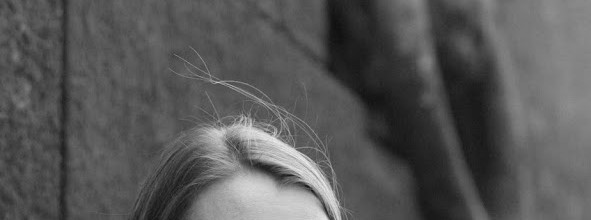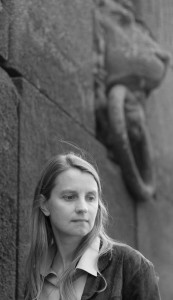
Today is a rare experience – I’ve interviewed an author whom I actually have met! Sally Hinchliffe, who used to work at Kew Botanic Gardens(one of my favourite places) turned up at a reading – not to see me particularly, but we got to talking, found we had much in common, and so when her novel came out, I was delighted to read it.
The novel, Out of a Clear Sky, is … clever. And I say that in full knowledge of what the word ‘clever’ means to most readers, and that it’s a turn-off. But this is the other kind of clever; the kind that leaves a little hole of worry or doubt or expectation in your head as you read and then knits up that gap with perfect timing and economy so that you, the reader, feel satisfied (a) that you were clever enough to spot the thing in the first place and (b) that the writer was only playing with you and knew exactly where and when to answer the question that you’d been asking yourself. As an example (and not to play with spoilers here) my heart did sink the tiniest bit when I found the protagonist was called Manda and her sister Zannah – such outlandish names, I thought, and wondered why. And then I found out why, and the solution was so clever, and so apposite to plot development, that I grinned to myself as I read on.
And I’m not a big birder, as some of you know. The truth is that I have a negative thing about migratory birds which comes from having been on a couple of ringing programmes in my formative years – there’s nothing like having a screaming bird defecate on you as you try to place a band round its scaly little leg to give you shivers as first swallows arrive. But Sally did reconcile me to the forgotten joy of waiting and watching, and Manda’s observations of native species are so perfectly slotted into the main storyline that even a non-birder like me will learn and enjoy. More than that though, the way the birding experiences foreshadow or amplify the human narrative is excellently handled. As I say, clever, in all the best senses of the word.
So, over to Sally:
1.It’s never a good idea to read too much autobiography into fiction, but are you a twitcher?
Never a twitcher! Technically, twitchers are the ones that go chasing off after rarities, the birds that get blown off course during a migration, and it can be a bit of a derogatory term. But yes, I did draw on my own love and experience of birdwatching for the setting of the book
2. More seriously, this novel weaves together a real love of nature and understanding of ecology generally, with a fast-moving and disturbing plot – why did you take that approach and did the idea of the linkages between the theme of birdwatching and the plot emerge naturally or did you have to sit down and work out how to do it?
The original hook of the novel – ‘the watcher watched’ – obviously sprang directly out of the birdwatching theme and that was how I conceived the novel from the outset. But as I wrote it some of the lesser themes emerged – particularly the idea of identity and identification, who people (or birds) really are, which of course is a key part of bird watching. And I found that the different birds used in the different chapter headings brought their own resonances; birds like the cuckoo and the raven and the owl all crop up over and over in myth and folklore and I was able to draw on that.
3.Did you ‘road test’ your twitcher credibility on test readers? If not, how do you go about making sure your book fits with that section of your audience that will probably be highly expert in this area ?
I didn’t – I probably should have, but I was too nervous! Some of the big birding sites have had copies for review, so it will be interesting to see what they make of it. I have tried very hard to be accurate about the birds themselves, and I did do a fair bit of research to make sure I’ve got my facts right. And I had to fit the needs and pacing of the plot with what the birds themselves would be doing – which sometimes entailed a fair bit of juggling round, but I didn’t want to have migrating swifts appearing too early, or birds nesting when they wouldn’t be. Most of the sightings of birds that Manda describes are based on my own observations, so they are as accurate as I can make them. In fact episodes in the book might actually be triggered by something I’ve seen: the wren facing off the magpie, for instance. And I hope I got right what it’s like to go birdwatching – the frustration, the excitement (yes, it is exciting), the way people behave, but that’s a very personal thing, and other people may have had different experiences.
4. Your protagonist is not a happy person – in fact there was something about Manda that made me think of Aurelio Zen, the late Michael Dibdin’s creation in his Roman/Venetian detective series. Did you deliberately set out to create a female character who has something tormented about her? If not, how did Manda’s personality emerge during the writing
That’s a tricky one. I didn’t set out to create any sort of character, really, mostly as you say her character emerged in the course of the writing. Given her childhood and the things that happen in the course of the book, she was always going to be a bit tormented, and I didn’t want to sugar-coat her character. What I hope comes across is that she’s tough and determined and self-reliant, and also that there’s a vein of black humour there that hasn’t quite been eroded away.
5. What’s the one mistake you made, when starting out as a writer, that still haunts you?
Not starting out! Or not starting out soon enough. I’ve wanted to write since I was seven; I still have somewhere the red & black notebook with my first attempts at a book in it. But I let the real world take over and the writing took a back seat for far too long. I took it for granted that I would write properly someday, and I wish someone had told me how long the whole process takes and how much you have to write before you become a writer.
6. How long did it take you to write Out Of A Clear Sky and what input have your agent and publisher given you that you can share with us?
From start to finish, three and a half years. Not all of that was continuous, because I’d have to put it aside for a few months at a time before going back to it and rewriting. I probably did three drafts on my own, then one rewrite in consultation with my agent, and then the final edit with Maria Rejt at Macmillan. Mostly the input was to do with the plot and pacing and overall shape of the novel – where to cut, where to expand, moving scenes around – rather than fine tuning the writing itself. I can’t over-emphasise enough the benefit of having a really good editor – I see too many books that have been badly edited, or perhaps where the author hasn’t been willing to take editorial direction, and a good story or fine writing is just lost because the book itself doesn’t work as a whole. As writers, we can be too close to our own work, and of course we don’t want to cut so much as a comma of our precious prose. Having a brilliant editor like Maria has been tremendous; she just brought the whole book into focus, and I’ve learned a huge amount in the process.
7. What’s your next writing project going to be?
I’m working on my second book, but it’s too early to say much more than that. It won’t be another bird one though.
8. If you were abandoned on a desert island, with just one book for company, what would it be?
I know it’s a hypothetical question, but I find the whole idea of being stuck on a desert island with just one book absolutely terrifying. I can’t go more than a day without having something to read. So whatever book is the longest would be the answer – it doesn’t matter what it is.
Out of a Clear Sky was published by Macmillan this very month, and is available everywhere – ISBN-13: 9780230531505 or 10: 0230531504. You can also hear Sally read from her novel on Monday 12 May, 6.30-8.15 pm at the RADA Foyer Bar, Malet Street, London WC1E 7JN, along with fellow Birkbeck Alumni Niki Aguirre and Matthew Loukes. Admission is free of charge, but with a suggested donation to Oxfam of £3.50. To reserve places in advance, email writloud@aol.co.uk.



4 Comments
Kip de Moll
6th May 2008Thanks for the exposure to another writer, but I’m curious why “Zannah” would be considered “outlandish. It has suited my daughter very well for 30 years…hmmmm, wait a minute, you might be right!
Roger Morris
6th May 2008Great interview – I shall be interviewing Sally a little later this month.
Kay Sexton
6th May 2008Well Kip, Zannah would be an unusual British name, perhaps not in other cultures …
Roger, I shall look forward to it!
Kip de Moll
7th May 2008It’s unusual in America too. That’s why I love it! Mostly we call her Zan.